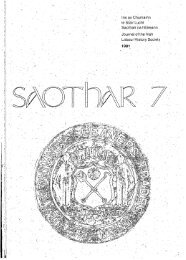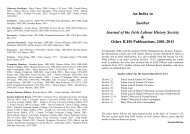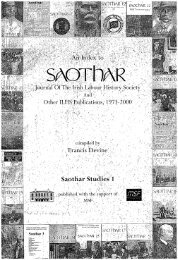You also want an ePaper? Increase the reach of your titles
YUMPU automatically turns print PDFs into web optimized ePapers that Google loves.
CorrespondenceThe Irish Labour Party, 1927-1933 Debate ContinuedMy article in Saothar 11 deals with theLaboUr Party (LP) for the period 1927-33 only. Iattempted to portray the fortunes of the LP ascompared with those of the other parties strictlywithin that period - a period that witnessed greatstrains and tensions in party politics and culminatedin the highest-ever turn-out in a generalelection. The basic problem faced by the LP wasone of identity. This was recognised by Norton'sstrong leadership in 1932 and the LP emerged atthe end of this period as a far more identifiableparty than it had been in 1927.Ellen Hazelkom (Saothar 12 , Correspondence)alleges that I ignore' the distinction between classidentity and electoral popularity'. This is not thecase: the decision to separate the party from thelTUC in 1930 recognised that working-classidentity, as represented by the LP up to 1930,extended only to trade unionists. The attempt tobroaden the party's appeal to the working-classmeant shedding that narrow image and appealingto the vast majority ofIrish workers who were nottrade unionists. 'Electoral popularity' (to useHazelkom's phrase) demanded such a departure.Incidentally, electoral popularity is (or should be)a motivating force for any political party. Hazelkom'sdescri ption of the separation of the ILPTUC into two distinct organisations as 'merely(my emphasis) an attempt to stem the tide ofelectoral decline' seriously underestimates theimportance of electoral behaviour for any politicalparty. There was no 'desire to abandon class'as Hazelkom argues, rather a recognition that theclass which the LP sought to represent was notfully catered for by the offical trade union movement.Hazelkom refers to events outside the scopeof my article. The deletion of the 'Workers'Republic' concept from the party's constitutionand the split of 1944 were indeed highly significant.But it is totally wrong to charge the LP ofbeing' devoid of ideological and class substance'.How could such a party operating in the Ireland ofthe 1930s ever have inserted a clause in itsconstitution calling for a Workers' Republic?The charge that the LP was (is?) 'devoid ofclass substance ' is refuted not only by a long listof policy papers and programmes that go backbeyond the Democratic Programme of the firstDail, but also by analysis ofthe social backgroundof both party representatives and supporters whichis, and always has been, overwhelmingly working-class.Enda McKay,St. Anne's,Margaret Road,Malahide,Co. DublinWomen in Irish HistoryI am engaged in a research project on womenin Irish history - more specifically on women inradical politics in Ireland from the end of theeighteenth century to the 1850s. I would be veryinterested in contacting fellow researchers on thesubject, or those working generally on women inIrish history.Priscilla Metscher,Heidland 15,2802 Ottersberg 2,Federal Republic of GermanyTrade Union Records in theRegistry of Friendly Societies,DublinI am grateful to Enda McKay of the ILHS TradeUnion and Labour Records Survey for drawingmy attention to the following errors contained inthe list of 'Trade Union Files' appended to the endof my article on 'Trade Union Records in the5





